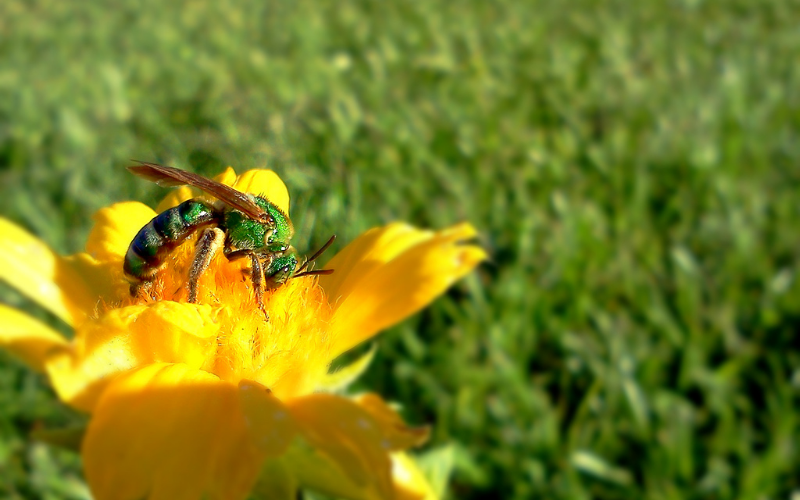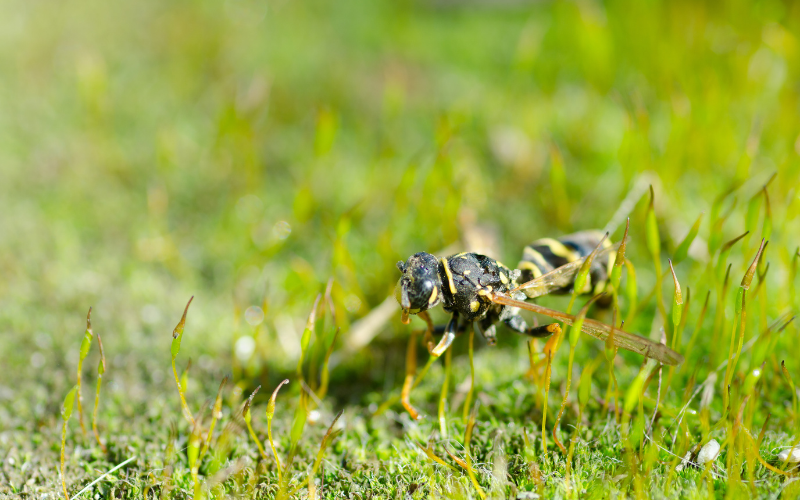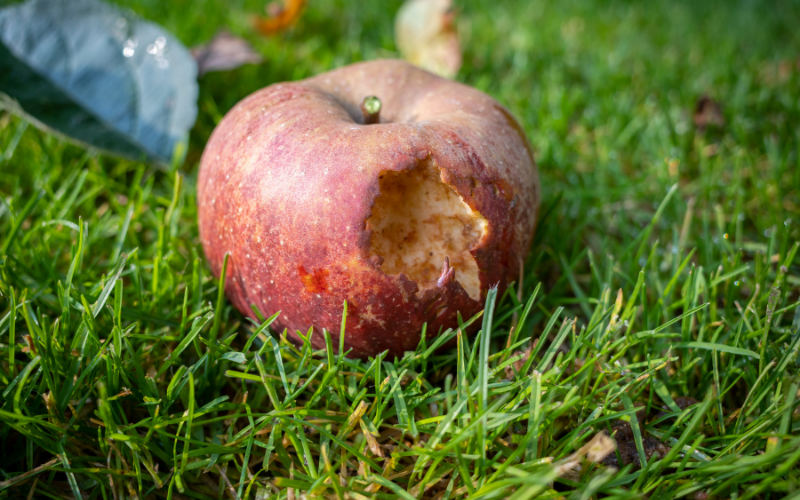Would you know what to do if you were suddenly surrounded by angry, swarming wasps while you were mowing? There’s no question this would be a stressful and pretty scary situation.
Avoiding wasps while mowing requires diligence and effort. However, there are things you can do to avoid this situation. Keep reading to learn how to avoid wasps while mowing the lawn.

The Top Reasons Wasps Are In Your Lawn
Wasps are considered predator bugs. Some of the reasons wasps may be in and around your lawn include:
- Feeding on insects in your grass.
- Feeding on sugar from fallen fruit, drinks, or food.
- Cicada killer wasps tunnel in the ground to feed on their chosen prey.
Now that you know the “why” when it comes to wasps on your lawn, let’s talk about how you can handle this situation.
How to Avoid Wasps While Mowing the Lawn
There are a whole bunch of things you can do to reduce your chances of coming face to face with a swarm of wasps while you’re out cutting your grass (nobody wants that!!).
Some of the best tips I’ve come across and tried myself include:
Locate and Avoid Wasp Nests
Wasps are small and difficult to see at a distance. However, they often kick into action as you get closer to their homes and “violate” their space. This makes them feel insecure, so they are more likely to attack.
Have a walk around your lawn before you start mowing to see if you can spot any wasps nests.
Use Wasp Repelling Plants
Another way to avoid wasps while mowing is by investing in wasp repelling plants. Put these in strategic locations around your lawn.
Two of the better options include basil and lemongrass, which both have strong fragrances, are great for cooking, and repel mosquitos and wasps.
Other options that wasps find repulsive include thyme, eucalyptus, and cucumber.
Wear Protective Gear
When mowing, your machine vibrates, and wasps will view this as a threat. Wear protective clothing to avoid being stung by wasps while you mow.
Gloves are a good start, as well as a long sleeve top and a hat.
Avoid Sweet-Smelling Cologne
In some situations, wasps will sting you even if you don’t disturb them. This could be because you wear floral-scented perfumes or colognes. When mowing, avoid wearing these things.
It’s also best to avoid using detergents with a floral scent, as this might attract them too.
Keep Your Lawn and Garden Clean
It doesn’t matter if it is time to mow or not; avoid dumping foodstuff onto your lawn. Never leave any type of garbage on your lawn, either.
Wasps will be attracted to the smell, and if you mow close to these items, you may get stung.

How to Keep Wasps Away from Your Lawn?
One of the best ways to avoid wasps while mowing the lawn is to take steps to help prevent them from settling in your yard in the first place.
Some tips that may help you achieve this include:
Clean Up After a Barbecue
During the summer, wasps will search for food, especially food with a lot of protein.
If you have a summer barbecue, be sure you don’t leave meat lying around. Also, avoid leaving any other food trash in the yard.
If you are spending time outdoors, be sure to look in your cup before taking a drink since wasps are attracted to the sugar.
Keep Trash Cans Sealed
Wasps are constantly searching for food. If you want to keep them from finding it, be sure your trash cans are secured and sealed.
Patch Up All Cracks or Crevices
Wasps look for small areas to build their nests. Keep them from nesting on your deck or porch by sealing cracks or gaps they may find.
Use Essential Oils and Herbs
As mentioned above, certain smells will repel wasps. Combining geranium, lemongrass, and clove essential oils can help keep wasps away. Peppermint oil is another effective deterrent.
Are Wasps Scared of Lawn Mowers?
According to experts, wasps are sensitive to the vibrations created by your lawnmower. And wasps don’t require much provocation.
So if you run a lawnmower, hedge trimmer, or anything else, close to a nest you may be attacked by some very angry wasps.

Are Wasps Attracted to Cut Grass?
The smell of cut grass has recently been identified as the plant’s method of signaling distress. However, it also summons certain insects to help it.
Unfortunately, the distress signal sent out by cut grass is attractive to parasitic wasps. So, yes, if you cut your grass, you are inadvertently signaling to wasps to come into your yard and lawn.
I Ran Over a Wasp Nest with My Lawn Mower…
Unfortunately, if you run over a wasp nest, the occupants won’t be too happy with you. You need to get out of the area and indoors if possible. And quickly!
At this point, it is best to call pest control professionals to remove any remnants of the nest and to ensure the area is wasp-free before you resume your mowing.
Why You Should Avoid Being Stung by Wasps?
Being stung by a wasp is never a pleasant experience. It’s best to avoid this situation because wasps contain toxic elements that could be fatal to you if you are allergic to them.
Also, the pain caused by a wasp sting is significant. This is especially true for older individuals.
While the threat of death from wasp stings is low, they can kill humans. Because of this, you need to ensure you properly protect yourself and anyone nearby while mowing.
Even if you search for a wasp nest before getting started, they are hard to detect. Which means you may be caught off-guard. Wearing the right protective gear will help protect you when out on your lawn.
The Bottom Line
Unfortunately, there is no 100% bullet-proof solution to avoid being stung by wasps or encountering wasps while you are mowing.
However, the tips and information above go a long way to helping you minimize the risk of encountering them while out on the green stuff.


My back yard is loaded with wasps. How can I get rid of them without store bought chemicals?I have a small yard and it’s full of them. Thank you for your time.
Hi Kim 🙂
The best way to get rid of wasps naturally (and for good) is to create an environment that they don’t want to be in. Often this means adding new scents to your yard and attracting wasp predators. You will also have to manually remove the wasp nests as you see them in order to speed up this process and prevent the wasps from reproducing or hibernating on your property.
Once the nests have been knocked down and destroyed (ideally burnt but sealed in a container and thrown away is also a good option) you can start to introduce smells that will keep the wasps away. The good news is that most of these scents are pleasant to humans.
Planting a plant that produces these smells is ideal as they work all season long every year as long as the plant is alive, and some of them even attract wasp predators. Plants that repel wasps via smell include peppermint, geranium, bay, lemongrass, spearmint, cat mint, catnip, borage, and citronella.
Predators that work to repel wasps include birds, such as blue jays and warblers, and solitary bees, including bumblebees and masonry or carpenter bees. Installing a bird feeder or adding plants that flower or produce pollen to your landscaping can help cut down on the wasp population.
I hope this helps!
Best, Tom.
Are wasps agitated by manual reel mowers?
Hi Phil,
I would say wasps are agitated by most things, but a reel mower is probably the least disturbing out of all lawn mowers.
Thanks for your comment!
Cheers, Tom.